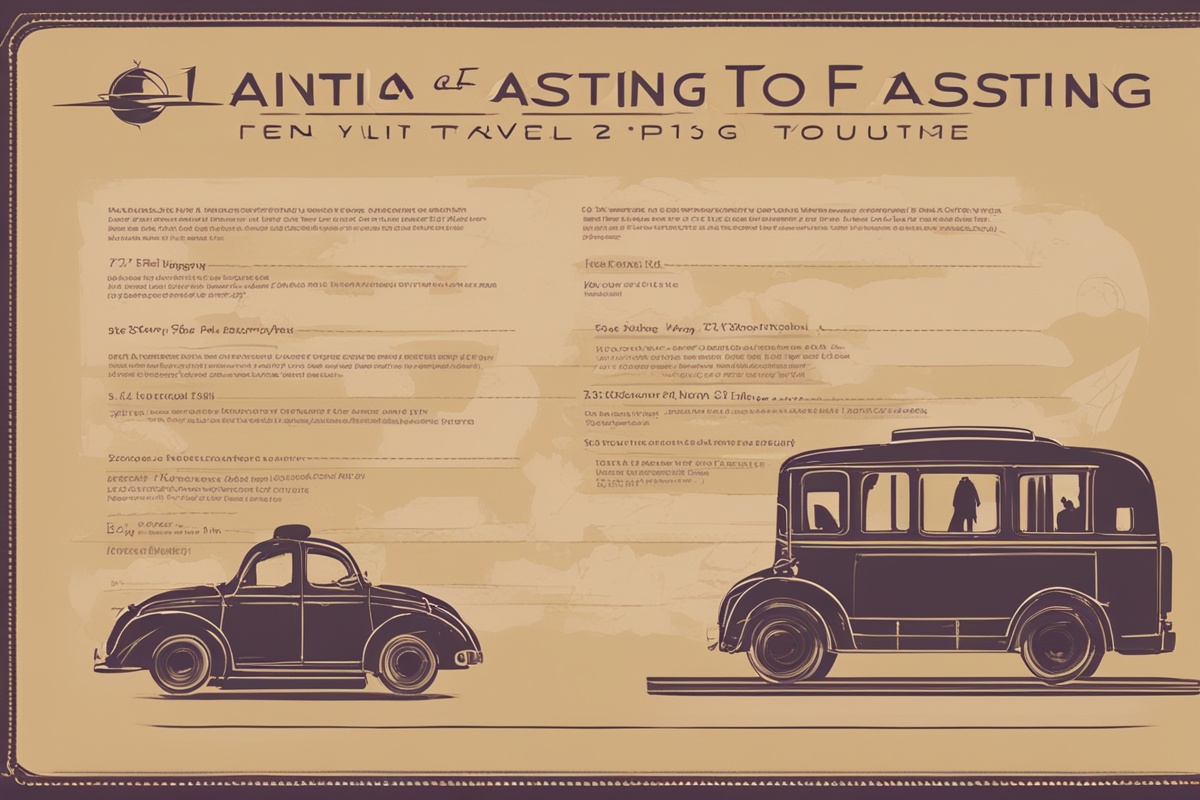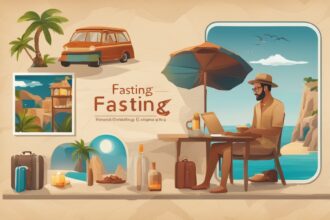Traveling can throw a wrench into even the most disciplined health routines, but what if I told you that fasting could be your secret weapon for staying healthy on the road? Combining the incredible fasting benefits with travel not only helps maintain your wellness goals but also enhances mental clarity and energy levels during those long journeys. Whether you’re embarking on a business trip or a leisurely vacation, fasting—when done thoughtfully—can be a game-changer. In this post, I’ll dive into how fasting works with travel, share practical tips for success, and explore the science behind why fasting is so powerful for your body and mind, even when you’re miles from home.
What Are the Core Fasting Benefits for Travelers?
Let’s start by unpacking why fasting is worth considering while traveling. Fasting, which involves abstaining from food for a set period, offers a host of health perks that can be particularly useful when you’re on the move. One of the standout fasting benefits is improved metabolic health. Studies show that intermittent fasting can enhance insulin sensitivity and support weight management, which is handy when travel often means irregular meals or overindulgence (Horne et al., 2015). Additionally, fasting promotes autophagy, a cellular cleanup process that helps your body repair and rejuvenate—perfect for combating travel fatigue (Mattson et al., 2017).
Beyond the physical, fasting can sharpen mental focus. When you’re navigating new cities or enduring long flights, a clear mind is invaluable. Fasting triggers the production of ketones, which serve as an alternative energy source for the brain, potentially boosting cognitive function (Veech, 2014). These fasting advantages make it a practical tool for staying sharp and energized, no matter where your itinerary takes you.
How Fasting Simplifies Travel Logistics
One of the most underrated fasting benefits during travel is the sheer convenience. Think about it—skipping meals means less time worrying about where to eat, especially in unfamiliar places with limited healthy options. Fasting eliminates the stress of finding food that fits your dietary preferences or budget. Instead of spending hours searching for a decent meal at an airport or tourist trap, you can focus on exploring or resting.
Moreover, fasting can save you money. Travel expenses add up quickly, and dining out is often a major culprit. By incorporating fasting into your travel plan, you reduce food costs without sacrificing health. It’s a win-win that aligns with the practical side of maintaining wellness on the go. Plus, fasting can help you avoid the digestive discomfort that often comes with heavy, unfamiliar meals during trips.
Navigating Challenges of Fasting While Traveling
While the fasting benefits are clear, traveling does present unique challenges. Time zone changes, jet lag, and unpredictable schedules can make sticking to a fasting window tricky. For instance, crossing multiple time zones might leave you unsure of when to break your fast. Then there’s the temptation of local cuisines—how do you resist fresh croissants in Paris or street food in Bangkok?
Another hurdle is hydration. Fasting doesn’t mean skipping water, but access to clean drinking water isn’t always guaranteed during travel, especially on long flights or in remote areas. Dehydration can mimic hunger, making fasting feel harder than it is. Despite these obstacles, with a bit of planning, you can reap the rewards of fasting without derailing your travel experience. Let’s look at some actionable strategies to make it work.
Practical Tips for Fasting on the Road
To help you harness the fasting benefits while traveling, I’ve compiled a list of practical tips that cater to different travel scenarios. These strategies are designed to keep you on track, whether you’re on a short domestic flight or an international adventure.
- Plan Your Fasting Window Around Travel Times: Align your fasting period with flights or long drives when eating might be inconvenient anyway. For example, start a 16-hour fast before a red-eye flight to sleep through most of it.
- Pack Hydration Essentials: Carry a reusable water bottle and electrolyte packets to stay hydrated. fasting can increase water loss, so aim to sip regularly (Popkin et al., 2010).
- Choose Nutrient-Dense Break-Fast Meals: When you do eat, opt for whole foods like nuts, fruits, or lean proteins to refuel effectively without overloading your system.
- Use Apps for Accountability: Apps like Zero or MyFast can help track your fasting hours, especially when jet lag messes with your internal clock.
- Be Flexible: If a cultural food experience is a must, adjust your fasting window rather than skipping the moment. Balance is key to sustainable fasting success.
Scientific Insights: Why Fasting Works for Travel Stress
Travel often comes with stress—delayed flights, crowded airports, or simply being out of your comfort zone. Here’s where the science of fasting benefits shines. Fasting has been shown to lower cortisol levels, the primary stress hormone, which can help you stay calm amid travel chaos (Cahill, 2006). It also supports the gut-brain axis, improving mood and resilience through better gut health (Foster & McVey Neufeld, 2013). When your body isn’t busy digesting heavy meals, it can focus on recovery, making fasting a natural ally against travel-related exhaustion.
Additionally, fasting may bolster your immune system—a critical advantage when you’re exposed to germs in planes or public spaces. Research indicates that short-term fasting can trigger immune cell regeneration, helping your body fend off potential illnesses (Cheng et al., 2014). These scientifically backed perks highlight why integrating fasting into your travel routine isn’t just feasible but incredibly beneficial.
Adapting Fasting to Different Travel Scenarios
Not all trips are the same, so your fasting approach shouldn’t be either. Tailoring your fasting plan to your travel style ensures you maximize the fasting benefits without unnecessary struggle. Below are some scenario-specific ideas to guide you.
- Business Trips: Stick to a 16:8 fasting schedule (16 hours fasting, 8 hours eating) to maintain energy for meetings. Break your fast with a light meal after landing.
- Long-Haul Flights: Fast during the flight to avoid heavy airline food, and focus on hydration with water or herbal tea.
- Adventure Travel: For hiking or active trips, consider a shorter fast (12:12) to ensure you have energy for physical demands while still gaining fasting advantages.
- Family Vacations: Involve family in modified fasting by skipping breakfast together, turning it into a bonding ritual while exploring new destinations.
Now, let’s dive into some specific research that underscores these benefits. Below is a brief look at studies supporting fasting’s impact on travel-related health concerns.
Studies Supporting Fasting Benefits for Travel
A growing body of research highlights how fasting can mitigate some of the health challenges associated with travel. A study published in Cell Metabolism explored how intermittent fasting enhances metabolic flexibility, allowing the body to switch between energy sources more efficiently. This is particularly useful during travel when meal timing is erratic, as it helps maintain stable energy levels even without regular food intake (Patterson & Sears, 2017). The study involved participants practicing a 5:2 fasting regimen over several weeks, demonstrating reduced markers of metabolic stress—something travelers often face due to jet lag and poor sleep.
Another relevant piece of research from Nature Communications examined fasting’s role in immune system regeneration. Conducted on both animal models and human subjects, the study found that cycles of fasting followed by refeeding could stimulate the production of new white blood cells, bolstering immunity. For travelers constantly exposed to new environments and pathogens, this suggests fasting could offer a protective edge (Brandhorst et al., 2015). These findings provide a strong scientific foundation for incorporating fasting into travel routines, reinforcing its practical and physiological benefits.
With these insights in mind, it’s clear that fasting isn’t just a trend—it’s a powerful tool for enhancing health, especially under the unique stresses of travel. Let’s wrap up with some final thoughts on making fasting a seamless part of your journeys.
Conclusion
Integrating fasting into your travel routine might seem daunting at first, but the fasting benefits—from improved mental clarity and metabolic health to reduced stress and logistical ease—make it well worth the effort. By planning ahead, staying hydrated, and adapting your fasting approach to your travel style, you can unlock these advantages no matter where the road takes you. Remember, fasting isn’t about deprivation; it’s about empowering your body to thrive, even in challenging circumstances. So, the next time you pack your suitcase, consider packing a fasting plan too. Your body (and wallet) will thank you for it. What’s your next destination, and how will you weave fasting into the adventure? Drop a comment below—I’d love to hear your thoughts!
References
- Brandhorst, S., Choi, I. Y., Wei, M., Cheng, C. W., Sedrakyan, S., Navarrete, G., … & Longo, V. D. (2015). A periodic diet that mimics fasting promotes multi-system regeneration, enhanced cognitive performance, and healthspan. Nature Communications, 6, 7008. https://doi.org/10.1038/ncomms8008
- Cahill, G. F. (2006). Fuel metabolism in starvation. Annual Review of Nutrition, 26, 1-22. https://doi.org/10.1146/annurev.nutr.26.061505.111258
- Cheng, C. W., Adams, G. B., Perin, L., Wei, M., Zhou, X., Lam, B. S., … & Longo, V. D. (2014). Prolonged fasting reduces IGF-1/PKA to promote hematopoietic-stem-cell-based regeneration and reverse immunosuppression. Cell Stem Cell, 14(6), 810-823. https://doi.org/10.1016/j.stem.2014.04.014
- Foster, J. A., & McVey Neufeld, K. A. (2013). Gut-brain axis: How the microbiome influences anxiety and depression. Trends in Neurosciences, 36(5), 305-312. https://doi.org/10.1016/j.tins.2013.01.005
- Horne, B. D., Muhlestein, J. B., & Anderson, J. L. (2015). Health effects of intermittent fasting: Hormesis or harm? A systematic review. The American Journal of Clinical Nutrition, 102(2), 464-470. https://doi.org/10.3945/ajcn.115.109553
- Mattson, M. P., Longo, V. D., & Harvie, M. (2017). Impact of intermittent fasting on health and disease processes. Ageing Research Reviews, 39, 46-58. https://doi.org/10.1016/j.arr.2016.10.005
- Patterson, R. E., & Sears, D. D. (2017). Metabolic effects of intermittent fasting. Annual Review of Nutrition, 37, 371-393. https://doi.org/10.1146/annurev-nutr-071816-064634
- Popkin, B. M., D’Anci, K. E., & Rosenberg, I. H. (2010). Water, hydration, and health. Nutrition Reviews, 68(8), 439-458. https://doi.org/10.1111/j.1753-4887.2010.00304.x
- Veech, R. L. (2014). Ketone ester effects on metabolism and transcription. Journal of Lipid Research, 55(10), 2004-2006. https://doi.org/10.1194/jlr.R046292






